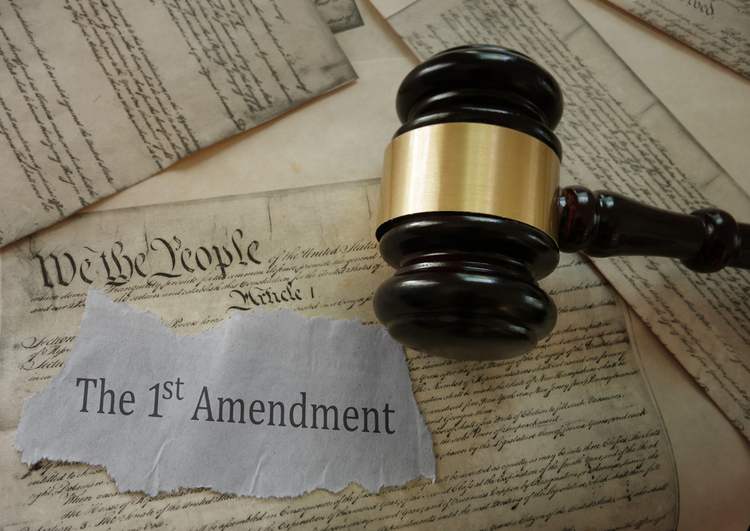Yale Law clinic helps writers group file First Amendment suit against Trump

Image from Shutterstock.
A group of writers and media professionals called PEN America has filed a lawsuit stating that President Donald Trump is violating the First Amendment by threatening and directing retaliation against media organizations and journalists.
The lawsuit, filed Tuesday in federal court in New York City, says journalists who report on the president or his administration reasonably believe they face a threat of retaliation for doing their jobs. The suit seeks a declaratory judgment that Trump’s retaliatory acts violate the First Amendment and an injunction preventing retaliation. The Connecticut Law Tribune and PBS have coverage; press releases are here and here.
Co-counsels in the case are Protect Democracy and the Yale Law School Media Freedom and Information Access Clinic.
The suit says Trump has repeatedly called for action to punish Amazon because its chief shareholder, Jeff Bezos, owns the Washington Post. The threats led to “a pronounced dip” in Amazon’s stock value in July. Then the president directed the U.S. Postal Service to review its financial practices, including the shipping rates it offers companies such as Amazon, according to the suit. On Oct. 11, the Postal Service proposed a 12-percent rate increase for the Parcel Select service used by Amazon.
The suit also says Trump has threatened action against CNN. During the 2016 presidential campaign, the suit says, Trump threatened to use the Department of Justice’s merger review process to retaliate when it reviewed a planned merger between CNN parent company Time Warner and AT&T. After Trump’s election, the DOJ sued to block the merger. The lawsuit did not succeed.
Trump also has threatened to revoke broadcast licenses and once banned a CNN reporter from a Rose Garden press conference, the suit says.
PEN America CEO Suzanne Nossel elaborated on the theory of the lawsuit in an article for Politico.
“Although the president can launch verbal tirades against the press, he cannot use the powers of his office to suppress or punish speech he doesn’t like,” Nossel wrote. “Presidents are free to mock, needle, evade and even demean the press, but not to use the power of government to stifle it.”
The Yale Law School Media Freedom and Information Access Clinic describes itself as a legal services clinic dedicated to increasing government transparency and protecting freedom of expression. The clinic was established in 2009 by four Yale law students who believed many journalists had no access to legal services as investigative reporting moved from traditional news organizations to websites, blogs and other startups.
The clinic has litigated gag orders, defended libel claims and pursued access-to-information cases. The information sought includes documents on death penalty procedures, secret opinions of the Foreign Intelligence Surveillance Court, sealed records in the case of a Guantanamo detainee, and judicial records in Philadelphia.
A co-director of the clinic is Yale law lecturer David Schulz, a senior counsel at Ballard Spahr. Schulz was a supervising attorney in the PEN America case, along with John Langford, also a Yale law lecturer.
Schulz answered the ABA Journal’s questions by email. An edited version is below.
ABA Journal: How did the clinic become involved in the PEN America case?
Schulz: “Over the last nine years, the Yale Media Freedom and Information Access clinic has taken on a number of important First Amendment cases related to newsgathering and the enforcement of journalists’ First Amendment rights. In this case, PEN and Protect Democracy enlisted the clinic’s assistance early on in the development of the litigation.”
ABA Journal: How is work on the case divided between students and lawyers?
Schulz: “As with all cases at the MFIA clinic, the students … are involved in all aspects of the litigation, including client communications, legal research, drafting court documents and formulating press strategies. Students take a leading role in litigation. In the PEN case, the students conducted a number of legal research projects and reviewed and revised drafts of the complaint. The students also participated in conversations around strategy and outreach. The clinic’s supervising attorneys advise the students, review their research and collaborate on the drafting of court documents.”
ABA Journal: How has the clinic experience helped students prepare for their careers?
Schulz: “The MFIA clinic experience exposes students to real-life lawyering, often for the first time. MFIA also allows students to explore potential career paths, develop subject-matter expertise, and get a sense of what being a lawyer is actually like.”
ABA Journal: Would you like to say anything else about the clinic’s involvement?
Schulz: “This lawsuit furthers one of MFIA’s core missions: to defend the rights of newsgatherers, whose work is essential to the functioning of our democracy. The president’s threats and retaliatory actions against his media critics undermine our country’s constitutional commitment to a free and independent press.”



